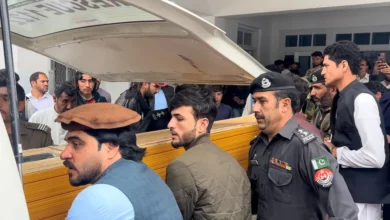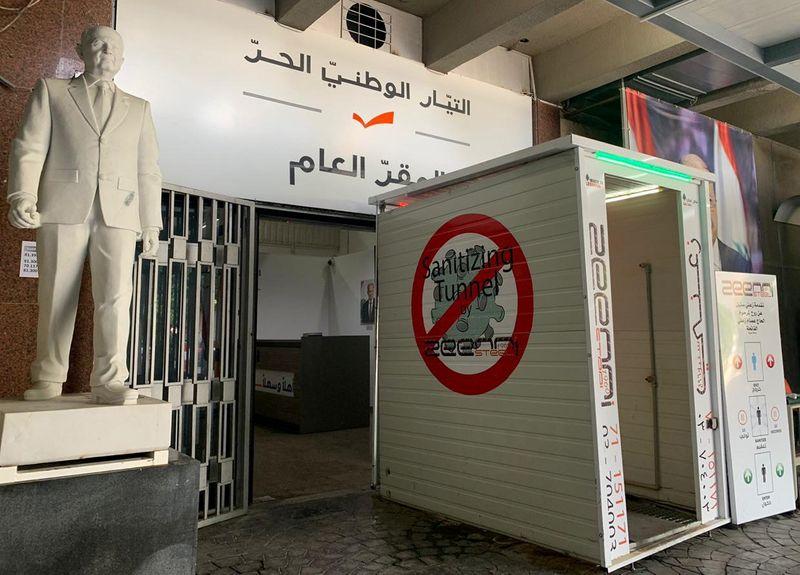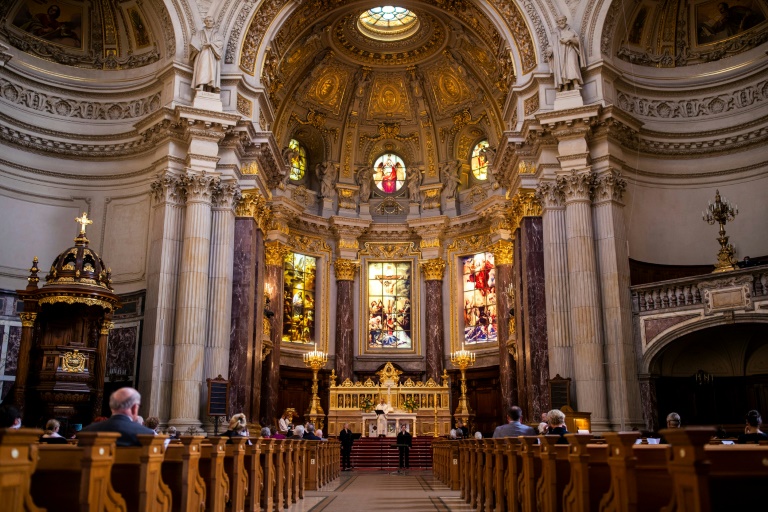Alexandria–Walking along the buildings of Street 45, between Miami and el-Asafra in Eastern Alexandria, Peter Fares, a young Coptic man from the area, vividly recalls how this street became a battlefield four years ago.
“We heard people knocking so strongly on the door of our building. I saw them carrying swords from the balcony and I felt that the moment they will break in, they will come up to our apartment and kill us all,” says Fares, a 27 year old middle-class resident.
In April 2006, Alexandria’s Christians gathered to mourn the death of Nushi Girgis, who was stabbed at the St. Mark and St. Peter’s Church in Sidi Bishr, during a series of simultaneous attacks on three Alexandrian churches. As the funeral approached Street 45 and mourners chanted religious hymns, people began throwing stones at the funeral procession from their balconies. The scene quickly turned into a war zone as men with sticks and swords fought with mourners, shouting Islamic slogans. In the process, shops were reportedly broken and robbed.
“We were scared for the day, thought about leaving Egypt for a month and then somehow, forgot about it,” says Fares. But when asked to reconstruct the events of the day, he recommends unpacking the word sectarianism. He recognizes discrimination against Copts, but he also notes that circumstances must be right for violence to explode.
The urban transformation of Street 45 could be one of those circumstances.
“The street used to be desert some 30 years ago. It was randomly inhabited by rural migrants from Upper Egypt and many outlaws connected to terrorist cases in the 1990s. The area was never properly urbanized by the governorate,” says Fares, who has lived there for the past 25 years.
A bridge bifurcates Street 45. To the north, palms grow on traffic islands in the middle of the paved street leading to the shore. To the south, where the chaos occurred four years ago, lies another reality: slum-like buildings, piles of garbage, and unpaved bits of the street. The two halves of Street 45 are held together in name only. Fares says successive governors in Alexandria only cared about developing the city’s seaside, forgetting the southern half.
“The real question was the role of the security. Riot police eventually cordoned the area but weren’t intervening at all to stop the actual fight,” remembers Fares. “After three hours, everything stopped, the area was emptied, and the governor, besides the head of the security directorate, passed through the street. Trucks carrying signs of the Quran and the Virgin Mary followed them. It was so weird that we felt it was staged. We don’t know why, but some people suggested the government is trying to convince us of the need to move from the emergency law to the anti-terrorist act.” In March 2006, Prime Minister Ahmed Nazif ordered a committee to draft an anti-terrorism law to replace the incumbent emergency law.
“I can’t tell exactly why it happened, but it’s not simply hatred between Christians and Muslims,” says Hani Yacoub, a Christian who runs a 30-year-old nut shop that was destroyed during the fighting. “I saw shear vandalism and robbery. At the time, we were angry at Muslims, but soon it went away.”
Mohamed Ibrahim, a Muslim barber who has rented a shop in the area for the past 12 years, was spared from the damage. “But we were not spared from the losses," he says. "We couldn’t work properly for more than a month. The security cordoned the street and our clients shied away from coming.”
Ibrahim says that when the chaos started, he went to help his Christian neighbor, who owns a children’s clothing shop, as his place was destroyed. “If I am to blame someone, I would blame the security. The mourners march should have been secured from the beginning.”
Walking down the street pasted with stickers bearing Islamic slogans, Fares pointed to the neighborhood’s church. According to him, it was built 15 years ago by a Christian resident as a small prayer house. When the number of Christians in the area increased, he wanted to restore it and add space to it, but was not granted a license to do so until 2009.
Restrictions on building and restoring churches are a common flash point in sectarian conflict in Egypt. Joseph Malak, vice-president of the Word Organization for Human Rights, which monitors Copts’ rights, says that they have been trying to reverse a case in which the governorate decided to dismantle a service center affiliated with the Coptic Church in King Mariout, southwest of Alexandria. “We got a court ruling showing the Church’s ownership of the service center, but it was ignored by the executives who went on with the dismantlement procedures,” he says.
According to Ashraf Boutros, the legal consultant of the Coptic Patriarchate in Alexandria, in the past, any church restoration had to be authorized by the president of the republic. “Only recently were governors given the right to authorize restorations,” Boutros says.
“During the last governor’s [Abdel Salam Mahgoub] term, it was easier to issue authorizations for building and restoring. But currently, things are more complicated.”
Boutros is currently working on five court cases related to governorate orders to remove buildings affiliated with the Coptic Church. “We often get letters from the governorate now asking for the legal document proving the church’s ownership of a certain building, when it has been there for over 70 years and is known to be a Christian property. It could be mere bureaucracy, but it definitely fuels anger.”
In October of last year, one of Boutros’s relatives, George Fathi Shafiq, 29, was found handcuffed and dead in his apartment. Shafiq, a public relations officer in a hospital, was also a popular church deacon in Alexandria. Upon investigations, police told Shafiq’s family that two assassins killed him because he was in a homosexual relationship with one of them and his brother, an ex-prisoner, wanted revenge.
Mouqbel Sobhi, one of the lawyers handling his case, said there could be a sectarian dimension, especially after the forensic authorities denounced claims that one of the assassins was in a relationship with Shafiq. Moreover, police proved that the crime was premeditated, which raised doubts for Shafiq’s lawyers’ about whether the assassins were incited by a third party.
The first hearing in the case is to be held next week and Sobhi hopes for a death sentence for the older assassin and a ten-year sentence for his younger brother. But he doesn’t expect such a harsh verdict. “I don’t blame the judiciary. I blame the police.”
Like many, Sobhi refuses to see sectarianism as a widespread embodied sentiment among other than the less educated. For him, the case of Shafiq and other cases of sectarian violence are prompted by ignorance and are not properly dealt with by the state.
“The state has been off developing the economy, while neglecting important social issues,” says Malak of the Word Organization for Human Rights. “There is ignorance, which is fueled by the intellectual violence propagated through satellite programming. The whole of Egypt is suffering from illiteracy, not just of reading and writing, but a cultural illiteracy.”
For Malak, the swords brandished about Street 45 were a symbols of ignorance more than sectarianism. That makes them all the more dangerous. “The state needs to deal with the root causes of the problem, mainly education and religious discourse. What needs to be done immediately is reinforce the protective role of the security.”
Driving across the busy streets of downtown Alexandria, Mohamed Ramadan, a taxi driver, criticizes the security presence around churches ahead of the epiphany mass on 18 January. “Why such a fuss? At the end of the day, it’s a minority and has to remember we’re the majority. Egypt is an Islamic state and has to be organized according to Islamic rulings. The best thing is to keep silent. This is the only way to stop sectarianism.”
Talaat Boutros, a Christian manager of a boutique hotel in Alexandria, hears a lot of this talk when he takes public transportation. It doesn’t even strike him as strange anymore, for the Alexandria he once knew has been changing. "Now I am no longer surprised to hear hate sermons in the audio players of micro-buses. I prefer to stay in my hotel as much as possible.” For 35 years, Boutros has been working in a seaside hotel that attracts both locals and foreigners. For him, it remained a relic of a bygone cosmopolitanism.




